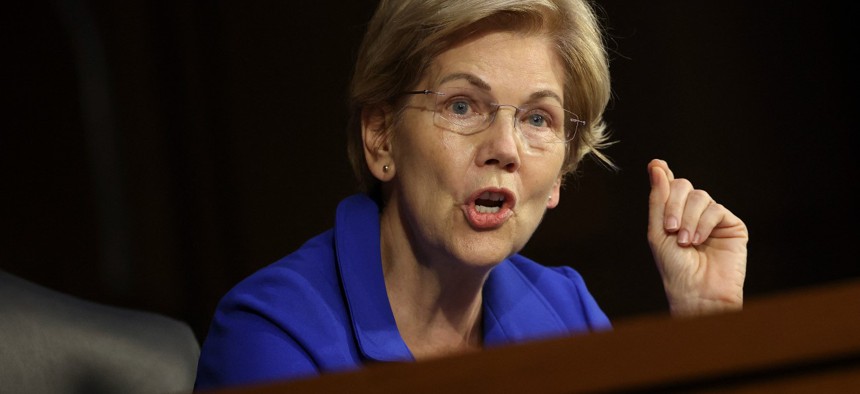
Sen. Elizabeth Warren, D-Mass., is one of the lawmakers who made the request. KEVIN DIETSCH/POOL/AFP via Getty Images
Lawmakers Want Watchdogs to Look Into Their Agencies’ Ethics Policies on Stock Ownership
This follows an investigation by The Wall Street Journal that found thousands of federal officials owned and traded stocks of companies that were affected directly by their agencies’ activity.
Two Democratic lawmakers asked eight federal watchdogs on Wednesday to review their agencies’ ethics rules in light of reporting on alleged widespread conflicts of interest due to federal officials’ stock ownership.
A massive investigation by The Wall Street Journal, first launched in October, found that thousands of federal government officials, both career and political, owned and traded stocks in companies that were impacted directly by their agencies’ activity. The Journal also found that sometimes agencies would just waive rules when financial holdings caused conflicts of interest.
“The findings of The Wall Street Journal’s investigation into conflicts of interest in the executive branch are deeply concerning and threaten to undermine the work the federal government does for the American public every day,” wrote Sen. Elizabeth Warren, D-Mass., chairwoman of the Senate Banking, Housing, and Urban Affairs Committee’s economic policy panel, and Rep. Pramila Jayapal, D-Wash., chairwoman of the Congressional Progressive Caucus, in letters to the inspectors general. “These conflicts were widespread – but not restricted – to the Trump administration. While the Biden administration has taken steps to crack down on lobbying influence and the revolving door in the executive branch, this investigation reveals a number of unaddressed concerns.”
According to The Wall Street Journal's reporting last month, some agencies are already looking to strengthen their ethics rules and a few made referrals to their inspector general.
“While some agencies have taken positive steps to re-evaluate their policies in the months since these conflicts were made public, this issue requires a whole-of-government response conducted transparently and publicly,” Warren and Jayapal wrote. Therefore, they asked the IGs to “conduct a broad and meticulous review of financial conflicts of interest” at their agencies.
Specifically, the letters went to the IGs for the Federal Housing Finance Agency; Housing and Urban Development, Treasury, Commerce, Defense, Energy, and Health and Human Services departments; and Federal Deposit Insurance Corporation.
Warren and Jayapal said that their review would inform further refinement of the Anti-Corruption and Public Integrity Act, which they first introduced in 2018. The act would ban individual stock ownership by senior agency officials, White House staff, federal judges, Cabinet secretaries and members of Congress, among other steps to tighten ethics rules.
The FHFA and Commerce IG offices did not respond for comment. The rest of the IG offices either declined to comment or said they said they were reviewing the letter.
Similar to the lawmakers, the Campaign Legal Center, a nonprofit focused on campaign finance and government ethics, filed complaints with four IG offices and the Office of Government Ethics on the matter in November. Brendan Quinn, senior communications manager for the group, said that as far as he knows, they haven’t heard back on the status of the complaints yet.







